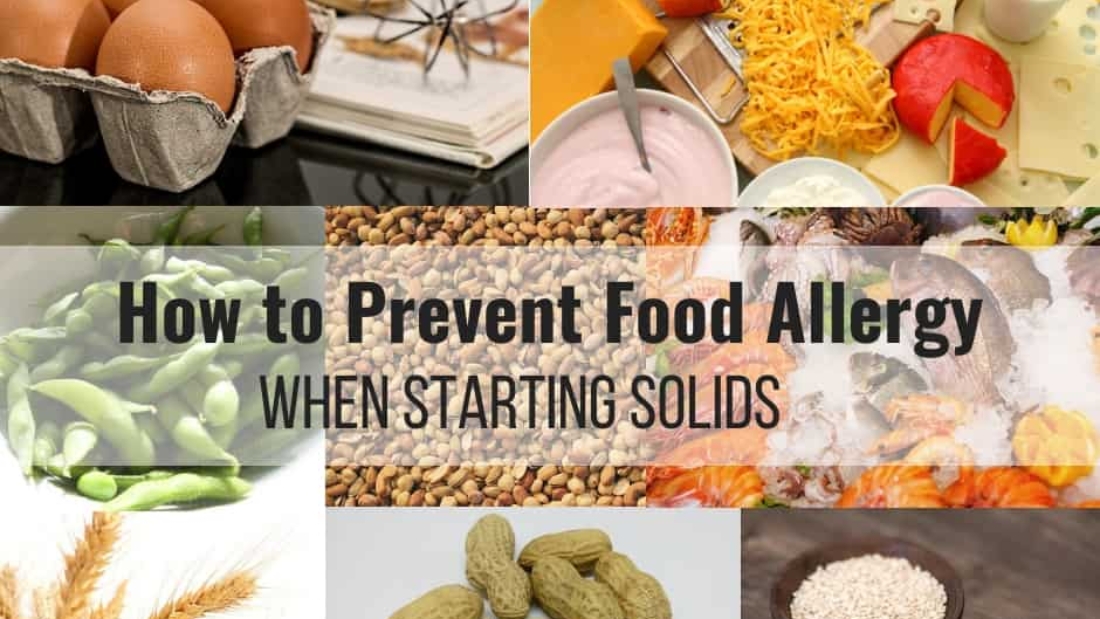Food allergies are on the rise. In the past, some expert recommended that dairy products and other common food allergens like eggs, peanuts and fish not be introduced until after an infant’s first birthday. More recently, evidence has shown that there is no reason to delay introduction of these foods beyond 6 months of age. In fact, delaying the introduction of these foods may increase your baby’s risk of developing allergies (here).
Current recommendations for solid food introductions are to wait until around 6 months of age. Look for your child’s readiness cues and provide only breast milk or formula until that time. There are no hard and fast rules as to what order or exactly what age to introduce certain foods to a baby. Babies really can go to town and eat what the rest of the family are eating (making sure the foods are an appropriate texture to avoid choking).
Read my article on When to Start Solids and How to Start Solids for more info.
What Is a Food Allergy?
A food allergy is when the body’s immune system mistakes a food as harmful and this cause a reaction. A food allergic reaction appear after a few minutes of giving a food and often will happen within two hours of having the food. Signs can also show up hours or days later. They can be mild (flushed face, abdominal pain, rash/hives, stuffy/runny nose) to severe (vomiting, diarrhea, blood in stools). The most extreme allergic reaction is anaphylaxis, where the throat starts to close and there is difficulty breathing.
Which Foods are Most Likely to Cause an Allergic Reaction?
The most common food allergens are:
- Eggs
- Fish
- Milk
- Tree Nuts (Walnuts, Almonds, Cashew, Pecan, etc)
- Peanuts
- Sesame
- Shellfish
- Soy
- Wheat
So should you feed your baby these foods? or avoid it? As of now, here’s what you need to know…
Risk of Developing Food Allergies?
Your baby may be at high risk for developing food allergies if a parent, sister or brother has an allergic condition such as: food allergies, eczema, asthma or hay fever. Your baby is at lower risk if no parent, sister or brother has an allergic condition.
What to Eat When Pregnant and Breastfeeding
When you are pregnant or breastfeeding, good nutrition is extremely important, and you should continue to eat all of the nutritious foods that you usually eat. You do not need to avoid common food allergens while pregnant or breastfeeding. Go ahead and eat peanuts or drink a milkshake. Avoiding potential allergens will not decrease your baby’s chance of having an allergy to these foods. Breastfeeding itself maybe protective against food allergies.
If you choose to avoid certain foods while pregnant or breastfeeding, speak with a Registered Dietitian or your health care provider to make sure you are getting all the nutrients you and your baby need.
When Can You Feed Babies Highly Allergenic Foods
For low risk baby, there is no benefit to delaying common food allergens past 6 months.
For high risk baby, there is no reason to wait until the baby is older before introducing highly allergenic foods, and some studies suggest that it may even be helpful to introduce foods early. Talk to your allergist about whether it would be help to do a food allergy test before feeding these foods to your baby or speak with your dietitian about a personalized plan for food introduction.
The goal is to choose foods that provide the most nutrition.
Here are a few steps that you could follow:
Try other food first
The first foods that you give your baby should not be the most allergenic ones. Start with other single ingredient foods, such as rice or oat cereal, yellow and orange vegetables (sweet potato, squash and carrots), fruits (pears, banana, apples) and green vegetables (peas, broccoli, spinach), tender meat. Once things are going well with these other foods you can then start to introduce the common food allergens.
Go slowly
Introduce just one food at a time, and then wait 3-5 days before trying the next new food (whether it is a highly allergenic food or not).
Choose the right time
When you are ready to introduce a highly allergenic food, pick a time when you’ll be at home and you will be able to watch your baby closely for any signs of reaction. Along these lines, it may be better to do this earlier in the day and not right before a nap or bedtime. Do not try these foods right before you need to leave the house to go somewhere, such as to drop the baby off at day care or take your other children to school. Although many babies react the first time they eat a food, you should be cautious for the first two or three times that your baby tries an allergenic food. After that you can relax knowing the chances of a reaction are extremely small.
Start with a small quantity
Don’t give your baby a full serving of a highly allergenic food on the first feeding. Start with a just a little. If there does not appear to be a reaction, then you can gradually increase the quantity during the next few feedings.
Use nut butters, not nuts
Never feed nuts to a baby. Babies can choke on nuts. To introduce nuts into your baby’s diet, use nut butters or pastes.
You can do so in small amounts and can even try rubbing some of the food on their chick and then lip to see if it produces a rash, before giving/feeding that food.
Bottom Line
If your baby has severe allergic reaction, carry an epi pen. Make sure your baby is on a balanced diet, if it is quite restricted, please talk to your dietitian. Also, you will need to become an expert on reading food label and searching for all of the various names for the food you are avoiding.
If the allergies are mild, you can always try re-introducing the food after a few months.


Leave A Comment